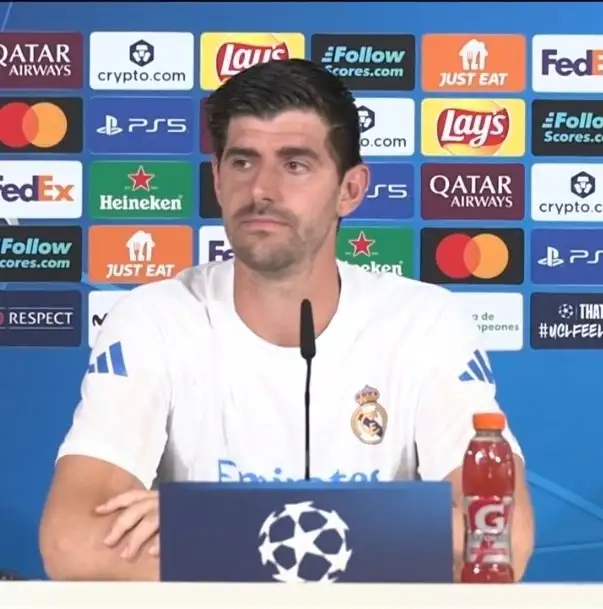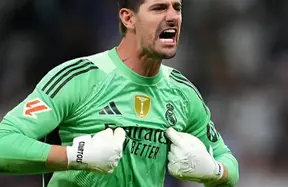Thibaut Courtois has challenged the priority of the proposed Wenger offside interpretation, arguing that football’s real drain is time-wasting, not millimetric offsides. The Real Madrid goalkeeper highlighted the seldom-enforced 8-second rule for keepers and the 30-second creep on routine throw-ins, urging officials to fix restart discipline first. His stance aligns with a growing referee-led argument: improve effective playing time and consistency before re-drawing offside lines. The debate is timely as IFAB continues to evaluate trials of an attacker-friendly offside tweak. Courtois’s comments will resonate across leagues where delays, not VAR lines, most distort match rhythm.

In recent comments around club media availability, Real Madrid goalkeeper Thibaut Courtois addressed proposed changes to the offside law associated with Arsene Wenger’s recommendations. He contrasted marginal offside interpretations with pervasive delays at restarts, pointing to the goalkeeper 8-second guideline and lengthy throw-in routines. The remarks arrive amid ongoing IFAB evaluations of potential offside adjustments and broader directives on added time and restart management across major leagues.
🗣 Courtois: "The new Wenger law? I don't know if it's the most necessary change. I think it's the time-wasting... We goalkeepers are given 8 seconds, but there are teams that gain 30 seconds on throw-ins. Other things need to change first. I agree that being even a millimeter
@MadridXtra
Impact Analysis
Courtois’s critique lands on the core tension between spectacle and law precision. While the proposed Wenger-aligned offside interpretation seeks to grant attackers daylight and reduce microscopic VAR interventions, it does not touch the dominant driver of fan frustration: low effective playing time. Across top leagues, ball-in-play often hovers near the mid-50 minutes, with throw-ins, goal kicks, and free-kick choreography consuming minutes with little sporting value. Enforcement asymmetry compounds it: the keeper’s 8-second provision is rarely sanctioned; throw-ins drift 10 to 20 seconds per event; substitution rituals and territorial gains add cumulative dead time that dwarfs VAR checks.
From a refereeing-operations perspective, the leverage is clear. Tightening restart protocols has immediate, measurable impact without redefining offside geometry. Codified counts for goalkeepers, visible management of throw-in locations and speed, and standardized added-time calculation (as seen in recent international tournaments) boost fairness and game rhythm. Conversely, altering offside margins risks new edge-cases: defenders may hold deeper lines to manufacture daylight, assistant referees must recalibrate body-part differentials, and VAR thresholds shift without fully eliminating frame-rate and calibration debates.
In short, Courtois is prioritizing interventions with the highest return on watchability. Fixing delays enhances equity for both attack and defense, reduces gamesmanship, and minimizes subjective friction. Even if an attacker-friendly offside fosters more goals, it will not rescue tempo if the sport tolerates 30-second throw-ins and leisurely restarts. The data-driven policy move is to stabilize restarts first, then revisit offside once operational consistency is banked.
Reaction
Fan discourse under Courtois’s remarks split along two lines. A sizable contingent agreed that he “speaks truth,” echoing the view that time-wasting dwarfs the annoyance of razor-thin offsides. These supporters emphasized that throw-ins, goal-kick routines, and substitution choreography bleed minutes, and that an 8-second rule without enforcement is symbolism, not deterrence. They argue match rhythm, not geometry, is the product most in need of a fix.
Another camp pushed back, insisting the proposed offside shift is overdue to restore attacking intent and reduce VAR micrometry. For them, optics matter: disallowed goals by millimeters sour viewing more than a few slow restarts. Some voices claimed the new interpretation would clarify decision-making and cut controversy at the goal line.
There were also skeptical notes framing the law tweak as unnecessary and warning of unintended consequences for defensive lines. A minority veered off-topic into geopolitical commentary, illustrating how volatile threads can dilute the core officiating debate. Still, the majority of football-focused replies coalesced around a pragmatic theme: time-wasting is visible, frequent, and fixable.
Notably, several comments proposed a middle path: pilot the offside interpretation in controlled trials while, in parallel, instructing referees to clamp down on restart delays with clear benchmarks and public communication. This reflects a sophisticated fan base increasingly literate in officiating policy and open to evidence-led iteration, rather than headline reforms in isolation.
Social reactions
I bet Journalists love Courtois 😂🙂
Lesego (@lesegokgaladi)
That is my captain right there 🤍🤍
Ikechukwu Ali (@IkechukwuA6992)
Courtois talking rules like he’s in a physics lab. just blow the whistle and let vibes decide
Abdul Qayyum 🪺 (@0xaq_)
Prediction
Expect governing bodies to proceed on two tracks. First, IFAB will continue controlled trials of an attacker-favoring offside interpretation in select competitions, collecting data on goals added, defensive line behavior, and VAR intervention volume. Early reports will focus on whether the change truly reduces controversy or merely shifts it to new body-position thresholds. Assistant referee training and VAR calibration protocols will be refined to handle the daylight concept consistently.
Second, in response to mounting pressure echoed by voices like Courtois, expect stronger operational guidance on restart management. We are likely to see standardized visible counts for goalkeeper possession, stricter enforcement on throw-in location and speed, and a renewed commitment to World Cup-style added time that mirrors the real minutes lost. Leagues may also encourage multi-ball systems with tighter ball-retrieval logistics to limit delay windows.
Clubs will adapt tactically. High-press systems could benefit from swifter restarts, compressing the game and amplifying turnovers. Defenses may initially drop a step deeper to hedge daylight offside risk, then recalibrate once patterns stabilize. Broadcasters, sensing fan appetite for flow, will champion effective-time metrics on-screen, making delays reputationally expensive for chronic offenders. If both tracks move in tandem, the net effect should be more minutes of football actually played, fewer VAR-centered flashpoints, and a clearer public understanding of what the laws are trying to protect: rhythm, fairness, and attacking ambition.
Latest today
- Real Madrid 'soap opera' talk before key match - but Ancelotti is not in danger
- Manchester City plot January move for Antoine Semenyo - perfect profile for Guardiola's fr...
- Ed Woodward admits United failed David Moyes - inside the missteps and what changes now
- Spurs and Man United enter race for 1. FC Köln’s Said El Mala at €30-40m
Conclusion
The mainstream fixation on offside margins is understandable but misplaced. Courtois’s intervention correctly reorders priorities: the sport hemorrhages value not at the VAR line but in the dead air of unmanaged restarts. Before redrawing offside geometry, competitions should deliver what fans intuitively crave—flow, immediacy, and a level playing field free of gamesmanship at throw-ins and goal kicks. That is a referee-operations problem, not a law-definition problem.
Only when restart discipline is consistently enforced will we have a stable platform to judge whether an updated offside interpretation truly enhances the product. Otherwise, a new line in the sand simply relocates controversy while the clock keeps bleeding. The practical path is obvious: clamp down on the 8-second rule, codify throw-in tempo, mirror real time lost in added time, and communicate these standards transparently. If the attacker-friendly offside ultimately tests well after that, adopt it with confidence. Until then, Courtois’s hierarchy of fixes is the evidence-led one—and the quickest route to better football on the pitch.













Lesego
I bet Journalists love Courtois 😂🙂
Caltic stæ
My captain
Ikechukwu Ali
That is my captain right there 🤍🤍
Abdul Qayyum 🪺
Courtois talking rules like he’s in a physics lab. just blow the whistle and let vibes decide
S∆VI☆
offside margins aren’t football’s biggest issue, time-wasting is a much bigger problem
PES (fan)
This guy speaks truth
Osei Adam
Will look into this well
Wheelchair Man♿
Spot on 🔥
Big “R”
That’s law shouldn’t be taking into action
Home
Not surprised you think like that
Obydullah💢
Courtois speaking pure facts on fairness
Yonan Ⓜ️Ⓜ️T
Wasnt needed
Charlie Garcia
Five days. That's how long it took Russia to disable 60% of Ukraine's natural gas infrastructure. Ukraine spent five MONTHS trying to do the same to Russia. Last Friday, we were one meeting away from making it nuclear. Thread 🧵
Concordium
🌍 Everything around us is getting smarter. From phones and homes to cities and economies. Now that same wave of intelligence has reached money itself, transforming not just how we move value, but what value truly means.